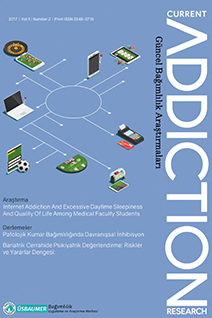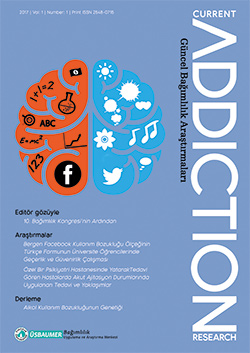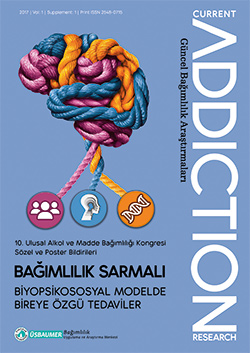ARTICLES
Original Article
Comparison of the Attachment Styles of Cigarette Smokers and Nonsmokers
Beyza Yaz,Hüseyin Ünübol,Gökben Hızlı Sayar
2019, 3(1), s:11-15
Aim: This study aimed to compare the attachment styles of smokers and nonsmokers.
Methods: 2800 individuals who participated in the study were given sociodemographic form and “Experiences in Close Relationships Scale”.
Results: Younger ages, male sex, low educational levels found to be related to smoking status. However smoking status or the number of daily smoked cigarettes not found to be related to attachment style.
Conclusion: According to the results of the study, attachment styles were not significantly different according to smoking status. The results of this study suggest that the other comorbid psychopathologies might be a more important risk factor than attachment style in smoking.
Review Article
Sever Yıldırım,Türker Tekin Ergüzel,Gökben Hızlı Sayar
2019, 3(1), s:25-30
Nowadays most of the young generation use internet intensively. These individuals are constantly online thanks to their smart phones. Since internet has a usage area that is so wide and smart phones give their users very easy access to it, many people feel desire to use smart phones. Smart phones come in many different price ranges and they are accessible for every consumer type. Many advertisements are being made to spread internet usage and make it a regular thing of everyday life. Also, smart phone companies produce more affordable phones. Smart phones make possible many useful tasks on internet for their users, such as; banking transactions, grocery shopping, watching movies and reading newspapers. Smart phones make everyday life easier and they make computer tasks without the need of using a computer; which also saves time. Purpose of this review is to overview the current situation about smart phone addiction and discuss the causes and results of this addiction.
Review Article
Ali Yasin Kafes,Selami Ülker,Gökben Hızlı Sayar
2018, 2(2), s:54-58
Food addiction has become a subject of increasing interest recently, particularly in societies where the prevalence of obesity is increasing. In individuals consuming excessive carbohydrates, it is suggested that the behavior of consuming these foods is transformed into a kind of addiction, and it is reported that the attitudes observed in these individuals can be common with the basic symptoms that are constantly observed in substance addiction. The suggested dysfunction of reward system which proposed to be related with food addiction tried to be supported by clinical and experimental studies. In this review, food addiction will be defined, and clinical overlaps, probable etiologic factors and treatment options will be discussed.



 2. Sayı
2. Sayı
 1. Sayı
1. Sayı
 Ek Sayı
Ek Sayı







